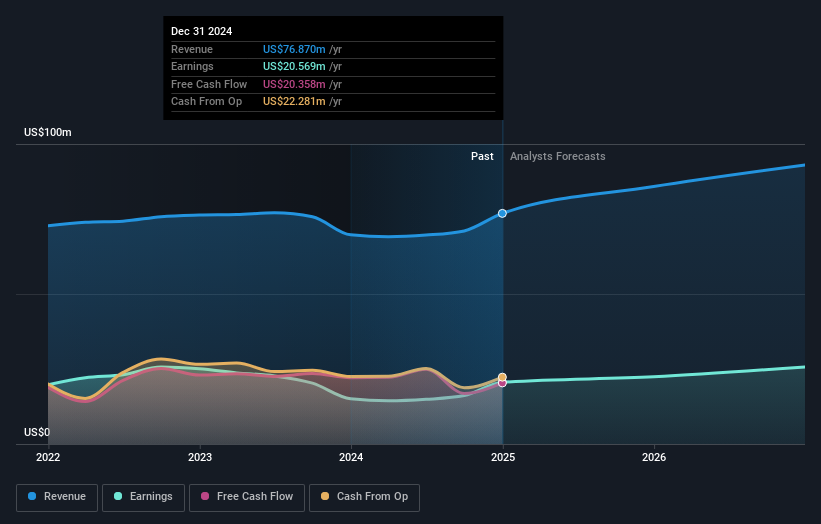- United States
- /
- Banks
- /
- NasdaqGS:FUNC
Retail investors who have a significant stake must be disappointed along with institutions after First United Corporation's (NASDAQ:FUNC) market cap dropped by US$24m

Key Insights
- The considerable ownership by retail investors in First United indicates that they collectively have a greater say in management and business strategy
- 43% of the business is held by the top 25 shareholders
- Recent purchases by insiders
To get a sense of who is truly in control of First United Corporation (NASDAQ:FUNC), it is important to understand the ownership structure of the business. With 48% stake, retail investors possess the maximum shares in the company. That is, the group stands to benefit the most if the stock rises (or lose the most if there is a downturn).
While institutions, who own 44% shares weren’t spared from last week’s US$24m market cap drop, retail investors as a group suffered the maximum losses
Let's delve deeper into each type of owner of First United, beginning with the chart below.
View our latest analysis for First United

What Does The Institutional Ownership Tell Us About First United?
Many institutions measure their performance against an index that approximates the local market. So they usually pay more attention to companies that are included in major indices.
As you can see, institutional investors have a fair amount of stake in First United. This suggests some credibility amongst professional investors. But we can't rely on that fact alone since institutions make bad investments sometimes, just like everyone does. When multiple institutions own a stock, there's always a risk that they are in a 'crowded trade'. When such a trade goes wrong, multiple parties may compete to sell stock fast. This risk is higher in a company without a history of growth. You can see First United's historic earnings and revenue below, but keep in mind there's always more to the story.

Hedge funds don't have many shares in First United. Our data shows that Dimensional Fund Advisors LP is the largest shareholder with 5.9% of shares outstanding. Meanwhile, the second and third largest shareholders, hold 4.7% and 4.3%, of the shares outstanding, respectively. In addition, we found that Carissa Rodeheaver, the CEO has 0.7% of the shares allocated to their name.
A deeper look at our ownership data shows that the top 25 shareholders collectively hold less than half of the register, suggesting a large group of small holders where no single shareholder has a majority.
Researching institutional ownership is a good way to gauge and filter a stock's expected performance. The same can be achieved by studying analyst sentiments. There is some analyst coverage of the stock, but it could still become more well known, with time.
Insider Ownership Of First United
The definition of company insiders can be subjective and does vary between jurisdictions. Our data reflects individual insiders, capturing board members at the very least. The company management answer to the board and the latter should represent the interests of shareholders. Notably, sometimes top-level managers are on the board themselves.
I generally consider insider ownership to be a good thing. However, on some occasions it makes it more difficult for other shareholders to hold the board accountable for decisions.
We can see that insiders own shares in First United Corporation. In their own names, insiders own US$15m worth of stock in the US$195m company. It is good to see some investment by insiders, but we usually like to see higher insider holdings. It might be worth checking if those insiders have been buying.
General Public Ownership
The general public, who are usually individual investors, hold a 48% stake in First United. This size of ownership, while considerable, may not be enough to change company policy if the decision is not in sync with other large shareholders.
Next Steps:
While it is well worth considering the different groups that own a company, there are other factors that are even more important.
Many find it useful to take an in depth look at how a company has performed in the past. You can access this detailed graph of past earnings, revenue and cash flow .
If you would prefer discover what analysts are predicting in terms of future growth, do not miss this free report on analyst forecasts .
NB: Figures in this article are calculated using data from the last twelve months, which refer to the 12-month period ending on the last date of the month the financial statement is dated. This may not be consistent with full year annual report figures.
New: AI Stock Screener & Alerts
Our new AI Stock Screener scans the market every day to uncover opportunities.
• Dividend Powerhouses (3%+ Yield)
• Undervalued Small Caps with Insider Buying
• High growth Tech and AI Companies
Or build your own from over 50 metrics.
Have feedback on this article? Concerned about the content? Get in touch with us directly. Alternatively, email editorial-team (at) simplywallst.com.
This article by Simply Wall St is general in nature. We provide commentary based on historical data and analyst forecasts only using an unbiased methodology and our articles are not intended to be financial advice. It does not constitute a recommendation to buy or sell any stock, and does not take account of your objectives, or your financial situation. We aim to bring you long-term focused analysis driven by fundamental data. Note that our analysis may not factor in the latest price-sensitive company announcements or qualitative material. Simply Wall St has no position in any stocks mentioned.
About NasdaqGS:FUNC
First United
Operates as the bank holding company for First United Bank & Trust that provides various retail and commercial banking services to businesses and individuals in the United States.
Flawless balance sheet and undervalued.
Similar Companies
Market Insights
Community Narratives



